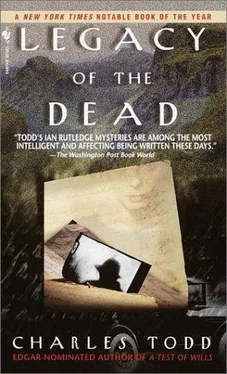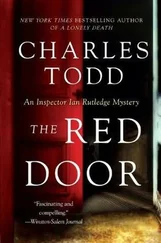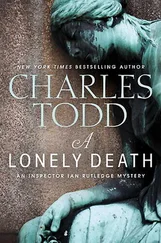Charles Todd - Legacy of the Dead
Здесь есть возможность читать онлайн «Charles Todd - Legacy of the Dead» весь текст электронной книги совершенно бесплатно (целиком полную версию без сокращений). В некоторых случаях можно слушать аудио, скачать через торрент в формате fb2 и присутствует краткое содержание. Жанр: Полицейский детектив, на английском языке. Описание произведения, (предисловие) а так же отзывы посетителей доступны на портале библиотеки ЛибКат.
- Название:Legacy of the Dead
- Автор:
- Жанр:
- Год:неизвестен
- ISBN:нет данных
- Рейтинг книги:5 / 5. Голосов: 1
-
Избранное:Добавить в избранное
- Отзывы:
-
Ваша оценка:
- 100
- 1
- 2
- 3
- 4
- 5
Legacy of the Dead: краткое содержание, описание и аннотация
Предлагаем к чтению аннотацию, описание, краткое содержание или предисловие (зависит от того, что написал сам автор книги «Legacy of the Dead»). Если вы не нашли необходимую информацию о книге — напишите в комментариях, мы постараемся отыскать её.
Legacy of the Dead — читать онлайн бесплатно полную книгу (весь текст) целиком
Ниже представлен текст книги, разбитый по страницам. Система сохранения места последней прочитанной страницы, позволяет с удобством читать онлайн бесплатно книгу «Legacy of the Dead», без необходимости каждый раз заново искать на чём Вы остановились. Поставьте закладку, и сможете в любой момент перейти на страницу, на которой закончили чтение.
Интервал:
Закладка:
“No one has done work here-not since 1914, the start of the war. Peter, the old man who was my aunt’s handyman, can tell you no work’s been done-”
“He has that. Inspector Oliver asked him. And your neighbors as well. But it would have been a secret business, after all. You’d not have told Peter, would you, if a body was being hidden? Nor your aunt, just as the letter said.”
“It’s not true! And it doesn’t make sense-if I brought the child here with me, how could I bring its dead mother, to bury her here! In a trunk-? In the back of the carriage-? Over my shoulder?” She was feeling desperate, frightened.
He winced at her bitter humor. “Mr. Robson addressed that. He said the mother might have recovered from the birth and wanted to keep the boy after all. And you stopped her when she came here to find him. I’ve had my orders-”
“This is my inn now. I won’t have anyone tearing it apart to search for a body- there’s no body here!”
“I must look, Fiona, or they’ll send someone else with a search warrant and an ax. Will you at least let me walk about and see with my own eyes that there’s nothing to find?”
“No!” Startled by her cry, the cat tensed and then vanished behind the heavy draperies at the side window.
“Fiona-”
“No!”
It took him a good half hour to convince her that he was the lesser of evils. That for her own sake she must agree to lead him around the premises. That he would look only where Fiona allowed him to look, move only what she allowed him to move. When, stiffly, she finally gave her permission, he said gently, “I’m sorry. I’m so sorry.”
But she ignored him. With a coldness he’d never felt in her before, she led him through the small wing, room by room, even where the child was sleeping in his crib, one hand tucked under his chin, and then through the aged building that had been her great-uncle’s inn and then her aunt’s, and now hers. Through the common rooms and the bars, through the kitchens and the cellars, and through the few bedchambers that could be taken by occasional travelers and marketgoers. Through the attics where old boxes and trunks littered the dusty floors amid the broken or outgrown furnishings stored there, the long-forgotten belongings of a family that had lived under the same roof for generations. To the cellars where there was still wine on the shelves but very little beer or ale-nobody came to drink it, and like the kitchens, the pantry, and barman’s little cubbyhole, the cellars were nearly empty. No sacks of flour or potatoes or onions, no tins of fruit or jars put up from the garden.
He looked as thoroughly as he could without insulting her. He sounded walls and stamped on the floors, peered into the chimneys and moved the largest chests and dressers, opened the tops of trunks and sniffed at their musty contents. Kept his mind and his attention on his task without letting his own misery show in his face.
When Alistair left, she accompanied him to the door and shut it almost before he’d thanked her properly.
Behind its solid oak, where no one could see her, she leaned her forehead against the cool wood and closed her eyes. And then the child, rousing from his sleep, began to sing off-key to himself, a Highland song she had taught him. She made an effort to collect herself, and called, “I’m coming, darling.” But it was another minute before she could turn and ascend the stairs.
Whatever Alistair McKinstry told his superiors, a fortnight passed before there were other policemen at her door, demanding to inspect the premises: Inspector Oliver, Sergeant Young, and both Constable McKinstry and Constable Pringle. In his anxiety not to offend her, McKinstry had not properly examined the outbuildings, she was told.
Fiona, torn between fear and disgust, told them to search as and where they pleased, then shut the door in their faces and kept the child out of sight.
It was in the stables in the inn yard that they found the bones, well hidden between the back wall and the little room the liveryman had lived in. Inspector Oliver had been the one to notice the unusual thickness of the plaster in one place. He tapped it with a hammer, found that there was space behind it, and tapped again, watching with interest as a spider’s-web crack ran across it. A suspicious man by nature, he went into the dusty room on the other side of the wall and found that a cupboard was not as deep as it ought to have been.
They had the wall down, then, and the skull rolled out before they had even seen the rest of the bones crammed into the long, narrow space. As it came to a stop, grinning up at them, Constable McKinstry smothered a curse.
The long hair still attached in places to the dry bone surely marked it as a woman’s.
IT WAS NOT until late August that they arrested her.
The bones in the stables had catapulted the investigation into a dozen new directions. Inspector Oliver, with grim thoroughness, had scoured Fiona’s past, had followed every lead that came his way, and had succeeded in bringing new information to light-damning information that supported the theory he found so compelling. The procurator-fiscal had seen fit, after speaking with the Chief Constable, to order a trial on the charge of murder.
Fiona found someone to care for the boy and went to jail with an aching heart. She couldn’t be sure who her enemy was, or how he or she had tightened a noose about her neck so cleverly. But she did know one very important thing about this person. The planning and the execution had been quite shrewdly done. Someone had carefully arranged her death, and left it to the law to do the deed for him-or her.
Which meant that someone hated her very deeply.
But who was it?
The only living person she might have asked was the one person she could never turn to for help. Even if she went to the gallows.
She had made a promise, and she dared not break it.
It was the boy she wept for in the night. She loved him completely and without shame. What would he be told now about the woman he believed to be his mother? Who would care for him and keep him safe if she was not there?
The loneliness was nearly unbearable. And the idleness. She wasn’t used to sitting in silence the day long, with nothing, neither a book nor a needle, to make the time pass. Even as a child in her grandfather’s house, there had been books. A basket of mending. Letters to be written. Now there was no one to write to. Where were the many people who had claimed to be her friends, who had welcomed her first for her aunt’s sake and then for her own? She had been visited by none of them, had had no word of encouragement from them. She felt abandoned and wished with all her heart that her aunt were here to comfort her.
And she had no faith in the lawyer who came to speak to her. There was something in his narrow eyes that warned her to be very careful. He was not the sort of man who trusted women.
Charles Todd
Legacy of the Dead
3
He was standing on the road, looking beyond the low stone wall and down into the churchyard, where the slope of the land evened out. There had been rain in the night; the stones were drenched with it and stood out blackly in the pale morning light.
His heart was pounding. The stones drew him like a magnet drawing iron, and he found himself trying to make out the name on each, searching for one he knew must be there. Then, with an effort of will, he turned to stare at the church tower, still swathed in low rain clouds, and at the tall windows above the door. He wanted to believe it was the church in Buncombe-Cornwall-but he knew it couldn’t be. He told himself it was a churchyard in France, but that, too, was a lie.
A flicker of movement distracted him, and then he saw the girl in the shadows of the church door. She was carrying flowers, her arms full of blossoms and long spears of greenery, and as she stepped into the light, he saw that she was looking at him. As if she’d expected him to be standing there. As if she knew he would come, in the end.
Читать дальшеИнтервал:
Закладка:
Похожие книги на «Legacy of the Dead»
Представляем Вашему вниманию похожие книги на «Legacy of the Dead» списком для выбора. Мы отобрали схожую по названию и смыслу литературу в надежде предоставить читателям больше вариантов отыскать новые, интересные, ещё непрочитанные произведения.
Обсуждение, отзывы о книге «Legacy of the Dead» и просто собственные мнения читателей. Оставьте ваши комментарии, напишите, что Вы думаете о произведении, его смысле или главных героях. Укажите что конкретно понравилось, а что нет, и почему Вы так считаете.












